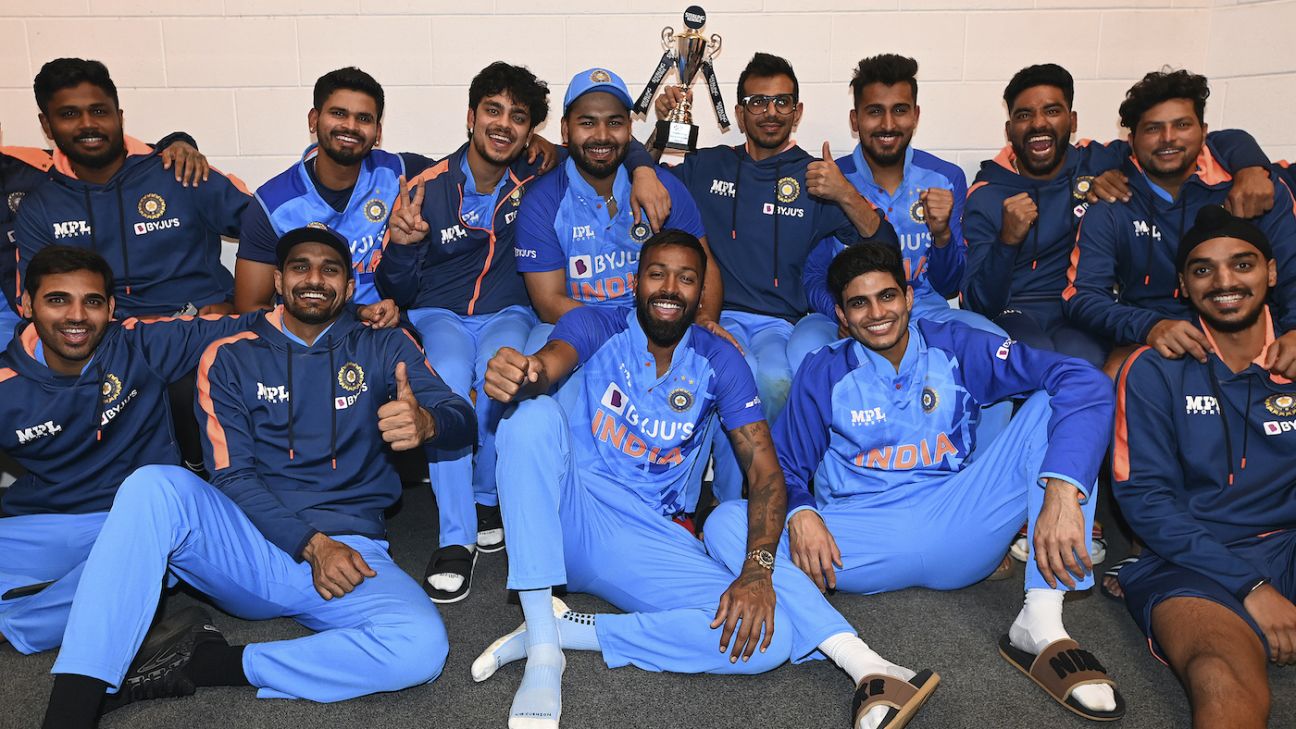I remember one such instance form 2007 T20 World Cup where Sreesanth did the same vs Australia and he did struck the bails, however the umpire didn't adjudged the batsman out.This is very simple.... A ball bowled is never dead until called by the Umpires. Hence, you award runs or a wicket or any event that happens until the ball is declared dead.
In case, had the ball hit the stumps the non-struker would be out.
You are using an out of date browser. It may not display this or other websites correctly.
Official, confirmed, verified "You are the umpire" thread
- Thread starter qpeedore
- Start date
NILAYSHAH60
Dreamcatcher
Sportsbookie
Fantasy Cricket Team
India
NZ....
PlanetCricket Award Winner
The Boys
Now we are not aware whether the ball was declared dead in such case. Also the rules may have changed over time!I remember one such instance form 2007 T20 World Cup where Sreesanth did the same vs Australia and he did struck the bails, however the umpire didn't adjudged the batsman out.
Ian Bell's run out is all I could remember.
What if the World T20 Final were to end in a tie. Assume it is impacted by rain. During the 12th over of the chase, rain comes down heavily. At this stage though, both team is tied on the Par score- in essence it is a tie. What happens next? Cause the minimum number of overs has been completed, the game can be deemed as complete. Under ICC regulations though, a tie must be played out until there is a clear winner. The conditions do not permit this to happen- do you share the trophy?
Boundary coun.... [This post has been truncated by New Zealand hackers]What if the World T20 Final were to end in a tie. Assume it is impacted by rain. During the 12th over of the chase, rain comes down heavily. At this stage though, both team is tied on the Par score- in essence it is a tie. What happens next? Cause the minimum number of overs has been completed, the game can be deemed as complete. Under ICC regulations though, a tie must be played out until there is a clear winner. The conditions do not permit this to happen- do you share the trophy?
D
Deleted member 211254
Guest
It was fair enough for Dhoni to offer calling him back. The mistake was by Ian Bell for not declining this offer. Since it was the fault of the batters. The ball was live the whole time.Now we are not aware whether the ball was declared dead in such case. Also the rules may have changed over time!
Ian Bell's run out is all I could remember.
qpeedore
SOTM Winner - July 2014
Invalid. The par score is not one to be tied. You must be above that score for a victory. In the case of a team making the par score it's a win for the team bowling second.What if the World T20 Final were to end in a tie. Assume it is impacted by rain. During the 12th over of the chase, rain comes down heavily. At this stage though, both team is tied on the Par score- in essence it is a tie. What happens next? Cause the minimum number of overs has been completed, the game can be deemed as complete. Under ICC regulations though, a tie must be played out until there is a clear winner. The conditions do not permit this to happen- do you share the trophy?
EDIT: as to the other issue, the ball is generally declared dead when it settles into the hands of the keeper or a fielder, or has crossed the boundary line or at the fall of a wicket. The definition of "settled" may be an issue though.
Nope. It's a tie and not a win for the bowling team.Invalid. The par score is not one to be tied. You must be above that score for a victory. In the case of a team making the par score it's a win for the team bowling second.

NZ vs IND Cricket Scorecard, 3rd T20I at Napier, November 22, 2022
Get cricket scorecard of 3rd T20I, NZ vs IND, India in New Zealand 2022/23 at McLean Park, Napier dated November 22, 2022.
Another one- rather morbid one.
Say, a batsman is facing a delivery. As soon as the bowler lets it go, the batsman collapses due to a sun stroke and falls on the stumps, thereby dislodging them. 5 minutes later, the batsman gains consciousness- is the batsman out?
Per MCC laws, the fielder needs to have appealed. Assume that the keeper went up in appeal, but later on, trailled off. what happens here?
Say, a batsman is facing a delivery. As soon as the bowler lets it go, the batsman collapses due to a sun stroke and falls on the stumps, thereby dislodging them. 5 minutes later, the batsman gains consciousness- is the batsman out?
Per MCC laws, the fielder needs to have appealed. Assume that the keeper went up in appeal, but later on, trailled off. what happens here?
IRL basis, I have seen many players get bowled/hit wicket and no one from the fielding team has appealed. An appeal is generally made when the clarity of a wicket is unknown, like in case of an LBW or an outside-edge catch. Whereas, when it the wicket is clearly noticable, an appeal is not often established since everyone by default assumes that a wicket is taken.Another one- rather morbid one.
Say, a batsman is facing a delivery. As soon as the bowler lets it go, the batsman collapses due to a sun stroke and falls on the stumps, thereby dislodging them. 5 minutes later, the batsman gains consciousness- is the batsman out?
Per MCC laws, the fielder needs to have appealed. Assume that the keeper went up in appeal, but later on, trailled off. what happens here?
Now coming to the out or not out in this case, by law the batsman is out since he has struck his own wicket by whatever means. What can happen is, the opponent team's captain has the power to withdraw the wicket if he wants. As we have seen in numerous instances where fielding captains have withdrawn wickets. MS Dhoni withdrawing Ian Bell's wicket (Praveen Kumar infamous runout incident). Sehwag withdrawing Lahiru Thirimanne's wicket (Ashwin had mankad him). Micheal Clarke withdrawing Shikhar Dhawan's runout during his debut match (Ball has slipped from Starc during his run up and accidently hit non-striker end stumps while Dhawan was out of his crease).
So after witnessing the mishap taken place on the field, the fielding captain can withdraw the wicket and allow the batsman to play again once he gains consciousness.
qpeedore
SOTM Winner - July 2014
Nope. It's a tie and not a win for the bowling team.

NZ vs IND Cricket Scorecard, 3rd T20I at Napier, November 22, 2022
Get cricket scorecard of 3rd T20I, NZ vs IND, India in New Zealand 2022/23 at McLean Park, Napier dated November 22, 2022.www.espncricinfo.com
Hmm. The rules have probably changed and I wasn't aware.
Another one- rather morbid one.
Say, a batsman is facing a delivery. As soon as the bowler lets it go, the batsman collapses due to a sun stroke and falls on the stumps, thereby dislodging them. 5 minutes later, the batsman gains consciousness- is the batsman out?
Per MCC laws, the fielder needs to have appealed. Assume that the keeper went up in appeal, but later on, trailled off. what happens here?
I'd go with what Parth said about this. The fielding captain should ideally withdraw the appeal in the spirit of the game. But the batsman should also retire hurt to get properly treated in any case. I think in the circumstances it wouldn't be unfair for the captain to even withdraw the appeal after the batsman is already in the pavilion and the news of how severe the injury has been made known.
It is mentioned that the batsman gained consciousness in 5 minsHmm. The rules have probably changed and I wasn't aware.
I'd go with what Parth said about this. The fielding captain should ideally withdraw the appeal in the spirit of the game. But the batsman should also retire hurt to get properly treated in any case. I think in the circumstances it wouldn't be unfair for the captain to even withdraw the appeal after the batsman is already in the pavilion and the news of how severe the injury has been made known.

If that wasn't the case I would have gone your route
qpeedore
SOTM Winner - July 2014
Batman, with all the new rules about concussions etc, you really expect a collapsed player to continue batting after he's revived? Joker does not agree. He's back in the hut almost immediately, even if in all the time it will take for a stretcher to come onto the field he recovers and says he's fine.It is mentioned that the batsman gained consciousness in 5 mins
If that wasn't the case I would have gone your route
If he insists on staying in the middle, the Joker part of me will set a field allowing quick singles. Let him run and collapse again.
qpeedore
SOTM Winner - July 2014
1. There is no television referral system in place. A bowler has had a couple of appeals turned down. He asks you why you said not out. Can you tell him why you made your calls?
2. You are fielding at square leg, and the batsman absolutely smashes one into your body. In self defense you throw your arms up and palm the ball away. But with your momentum and whatnot, the ball trickles onto the stumps with the batsmen attempting a third run and it dislodged the bails. The fielders appeal. Is it out?
3. A well-established batsman is off strike. The tail ender sends a sharp catch to the fielder at cover. He snatches it just above the turf, but then immediately (in the same motion) throws it across to the keeper, who finds the good batsman out of his ground. Obvioulsy the fielding team appeals. Who is out?
2. You are fielding at square leg, and the batsman absolutely smashes one into your body. In self defense you throw your arms up and palm the ball away. But with your momentum and whatnot, the ball trickles onto the stumps with the batsmen attempting a third run and it dislodged the bails. The fielders appeal. Is it out?
3. A well-established batsman is off strike. The tail ender sends a sharp catch to the fielder at cover. He snatches it just above the turf, but then immediately (in the same motion) throws it across to the keeper, who finds the good batsman out of his ground. Obvioulsy the fielding team appeals. Who is out?
qpeedore
SOTM Winner - July 2014
2 years hence, let's answer the questions and leave a couple or three or four or however much.
1 - It's up to you, really. You may give subtle indications, but not outright confirm. Aleem Dar used to do this for close LBW decisions before DRS and everyone thought it was totally fair and upstanding of him. He'd either nod or lean to off or leg side, showing where he thought the ball was going. But in terms of things that may happen to show up on replays later on (even without DRS, there's newsreels worldwide), you had better keep your mouth shut and your body language to a minimum.
2 - You are part of play. It's out. You were acting in self-defense.
3 - The first instance of a potential wicket is out upon appeal, so the well-established batsman is out, once you and your colleague are in agreement that the fielder was in control of both the ball and his body upon the throw to the keeper.
Leaving a couple, or three, or four. Happy 2025 to all, by the way.
1. After a long and much-storied and successful career as an umpire, this is to be your final match (let's say for the purposes of argument's sake it's First Class). After the first innings of both teams, the two captains approach you and your colleague - they want you to put your feet up and enjoy the rest of the match in the VIP stand. They offer to each stand in for you for the opposing team's innings. (Captain A umpires Team B, Captain B umpires Team A.) Your colleague is convinced they are genuine and you actually have a match referee who sees the decision as unusual but up to you. What can you do according to the Laws?
2. A debutant bowler, still a bit lacking in confidence, is thrown a (20-over-old) ball. He politely asks you and the batsman for one practice bowl "to get his run-up right". What do you tell him?
3. What was to be a bright sunny day of cricket started with Captain A winning the toss and electing to bat on a flat pitch. What happened within five minutes afterwards was a freak storm that delayed play for a session and a half. With groundsmen scrambling and covers aplenty, the pitch is now ripe for bowling. Captain A now wants to bowl. What do you tell him?
4. The Laws are clear on the call of Lost Balls - any fielder can call a ball as lost, but it's automatically 6 runs or however much the batsmen have ran (whichever is greater). The ball gets replaced, similar wear, etc. My question is, if in a Village match with tall grass and random animals in the outfield, if that lost ball is ever found again, and in a similar area, now what? (Bonus points if it sped through the digestive system of a creature!)
This one is more of an oddity but actually very fair point that I never actually noticed before...I'll just report it verbatim from the MCC:
So, does the ICC provide petrol or diesel for the mowers? Because it would be easy to just say it just isn't in the budget, lol. What with gas prices and all, even from a petrochemical-based island like Trinidad.
1 - It's up to you, really. You may give subtle indications, but not outright confirm. Aleem Dar used to do this for close LBW decisions before DRS and everyone thought it was totally fair and upstanding of him. He'd either nod or lean to off or leg side, showing where he thought the ball was going. But in terms of things that may happen to show up on replays later on (even without DRS, there's newsreels worldwide), you had better keep your mouth shut and your body language to a minimum.
2 - You are part of play. It's out. You were acting in self-defense.
3 - The first instance of a potential wicket is out upon appeal, so the well-established batsman is out, once you and your colleague are in agreement that the fielder was in control of both the ball and his body upon the throw to the keeper.
Leaving a couple, or three, or four. Happy 2025 to all, by the way.
1. After a long and much-storied and successful career as an umpire, this is to be your final match (let's say for the purposes of argument's sake it's First Class). After the first innings of both teams, the two captains approach you and your colleague - they want you to put your feet up and enjoy the rest of the match in the VIP stand. They offer to each stand in for you for the opposing team's innings. (Captain A umpires Team B, Captain B umpires Team A.) Your colleague is convinced they are genuine and you actually have a match referee who sees the decision as unusual but up to you. What can you do according to the Laws?
2. A debutant bowler, still a bit lacking in confidence, is thrown a (20-over-old) ball. He politely asks you and the batsman for one practice bowl "to get his run-up right". What do you tell him?
3. What was to be a bright sunny day of cricket started with Captain A winning the toss and electing to bat on a flat pitch. What happened within five minutes afterwards was a freak storm that delayed play for a session and a half. With groundsmen scrambling and covers aplenty, the pitch is now ripe for bowling. Captain A now wants to bowl. What do you tell him?
4. The Laws are clear on the call of Lost Balls - any fielder can call a ball as lost, but it's automatically 6 runs or however much the batsmen have ran (whichever is greater). The ball gets replaced, similar wear, etc. My question is, if in a Village match with tall grass and random animals in the outfield, if that lost ball is ever found again, and in a similar area, now what? (Bonus points if it sped through the digestive system of a creature!)
This one is more of an oddity but actually very fair point that I never actually noticed before...I'll just report it verbatim from the MCC:
Mowing
(a) The pitch
The pitch shall be mown on each day of the match on which play is expected to take place, if ground and weather conditions allow.
(b) The outfield
In order to ensure that conditions are as similar as possible for both sides, the outfield shall be mown on each day of the match on which play is expected to take place, if ground and weather conditions allow. If, for reasons other than ground and weather conditions, complete mowing of the outfield is not possible, the Ground Authority shall notify the captains and umpires of the procedure to be adopted for such mowing during the match.
So, does the ICC provide petrol or diesel for the mowers? Because it would be easy to just say it just isn't in the budget, lol. What with gas prices and all, even from a petrochemical-based island like Trinidad.
Similar threads
- Replies
- 15
- Views
- 2K
Your Cricket
General Bowling Thread
- Replies
- 94
- Views
- 11K
Users who are viewing this thread
Total: 3 (members: 0, guests: 3)









